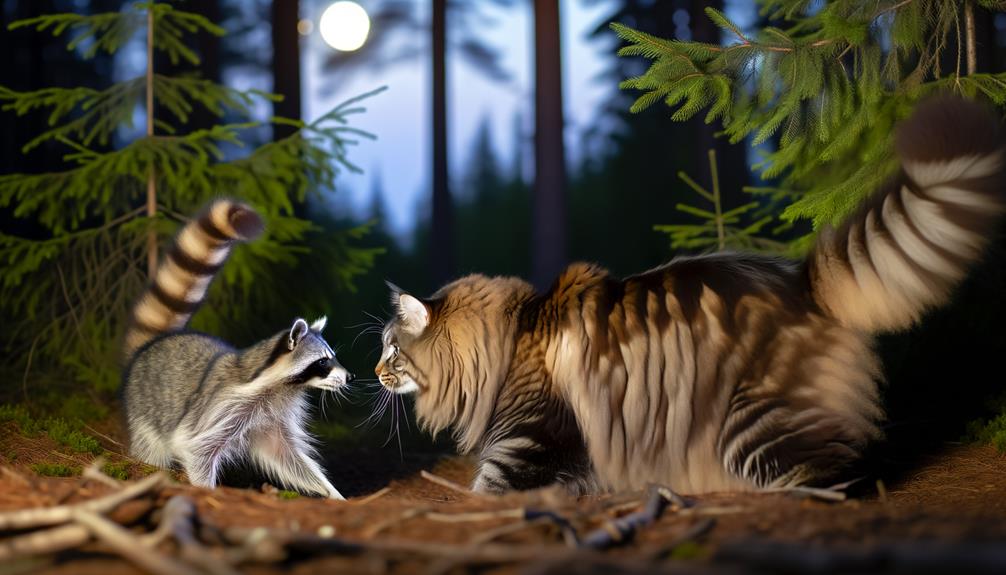Can a Maine Coon Kill a Raccoon? Facts Compared
Maine Coons, with their robust musculature and formidable hunting skills, theoretically possess the capabilities to kill a raccoon. However, raccoons, ranging from 11 to 20 pounds, have significant defense mechanisms including powerful bites, sharp claws, and strategic use of their environment for escape.
While Maine Coons can reach up to 18 pounds and 40 inches in length, real-life encounters often see both animals sustaining injuries rather than definitive outcomes. Various factors, including territorial instincts and physical condition, play critical roles in these interactions.
For a deeper understanding of the complexities involved in such encounters, explore further here.

Key Takeaways
- Maine Coons have strong predatory skills but typically weigh less than raccoons.
- Raccoons possess formidable defense mechanisms, including a strong biting force and sharp claws.
- Maine Coons are solitary hunters with keen vision and hearing.
- Actual encounters show variable outcomes; sometimes Maine Coons get injured.
- Uncertainty remains regarding Maine Coons consistently killing raccoons due to size and defense differences.
Size and Strength Comparison
In comparing the size and strength of a Maine Coon and a raccoon, it is essential to examine their respective physical dimensions and muscular capabilities.
The Maine Coon, one of the largest domesticated cat breeds, can weigh up to 18 pounds with a body length reaching 40 inches including the tail. Its musculature is well-developed, especially in the limbs and chest, facilitating agility and strength.
Conversely, raccoons typically weigh between 11 to 20 pounds and measure around 23 to 37 inches in length. They possess robust forelimbs and dexterous paws, which provide significant climbing and gripping capabilities.
Although their overall body strength is comparable, raccoons tend to have a slight advantage in upper body strength due to their climbing adaptations.
Natural Behaviors and Instincts
Understanding the natural behaviors and instincts of both the Maine Coon and raccoon necessitates a thorough examination of their predatory strategies, territorial tendencies, and survival mechanisms.
Maine Coons, Felis catus, exhibit solitary hunting behaviors, primarily targeting small prey such as rodents and birds. They utilize stealth and ambush techniques, leveraging their agility and keen senses.
Conversely, raccoons, Procyon lotor, display omnivorous feeding habits and are known for their dexterity and problem-solving abilities in foraging.
Both species exhibit strong territorial instincts but differ significantly in social structure; Maine Coons are more solitary, whereas raccoons may form loose groups.
Survival mechanisms for both include acute sensory perception and adaptability to various habitats, facilitating their respective ecological niches.
Defense Mechanisms of Raccoons
Raccoons employ a variety of defense mechanisms, including their formidable biting force, sharp claws, and strategic use of their environment to evade predators. Their biting force can exert significant pressure, often enough to deter or injure potential threats. Sharp claws are used effectively in both offensive and defensive scenarios, providing raccoons with the ability to climb swiftly and fight when necessary. Additionally, raccoons are adept at utilizing their surroundings, such as scaling trees or hiding in dense foliage, to escape danger. Understanding these mechanisms requires a detailed analysis of their anatomical and behavioral adaptations.
| Defense Mechanism | Description |
|---|---|
| Biting Force | Applies significant pressure to deter threats |
| Sharp Claws | Useful in climbing and combat situations |
| Environmental Strategy | Escaping via trees and dense foliage |
These strategies collectively enhance raccoons’ survival against various predators.
Predatory Skills of Maine Coons
Maine Coons display a variety of predatory skills, including their strong musculature, sharp hunting instincts, and skillful use of their physical agility to capture prey. These felines have sturdy limb muscles, allowing for significant strength and speed in their movements.
Their heightened senses, especially keen vision and hearing, aid in effective tracking of potential prey. Moreover, Maine Coons exhibit exceptional dexterity, utilizing their claws and teeth with accuracy to immobilize and subdue smaller animals.
Their strategic use of stealth, along with quick reflexive reactions, highlights their proficiency as hunters. Despite their domestic status, these traits emphasize the Maine Coon’s evolutionary adaptations, aligning them closely with their wild feline counterparts in terms of predatory effectiveness and capacity.
Real-Life Encounters and Evidence
Examining real-life encounters and evidence provides insight into the interactions between Maine Coons and raccoons, further elucidating the predatory capacities of these robust felines. Documented instances indicate that while Maine Coons possess the physical attributes and agility to engage in confrontations with raccoons, outcomes vary significantly based on various factors.
These include:
- Size Disparity: Raccoons generally outweigh Maine Coons, tipping the balance in direct confrontations.
- Behavioral Dynamics: Maine Coons exhibit territorial behavior, but raccoons are equally tenacious.
- Injury Reports: Anecdotal evidence from veterinarians highlights injuries sustained by Maine Coons in such encounters.
These insights underscore the complexities of interspecies interactions, emphasizing that while Maine Coons are formidable, the likelihood of them killing a raccoon remains uncertain.
Conclusion
In evaluating the potential for a Maine Coon to kill a raccoon, considerations of size and strength, natural behaviors and instincts, defense mechanisms of raccoons, and predatory skills of Maine Coons are essential.
Real-life encounters and empirical evidence suggest that while Maine Coons are formidable felines with significant predatory abilities, the robust defense mechanisms and aggressive nature of raccoons render such lethal encounters rare.
Consequently, the likelihood of a Maine Coon killing a raccoon remains low.






